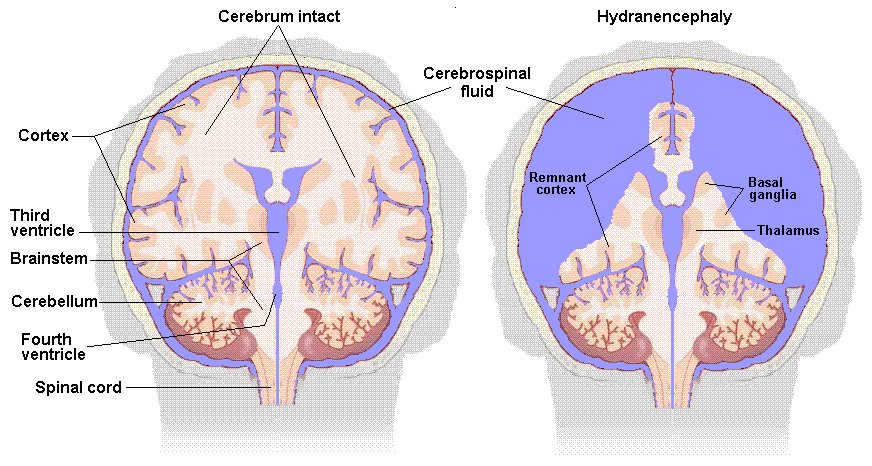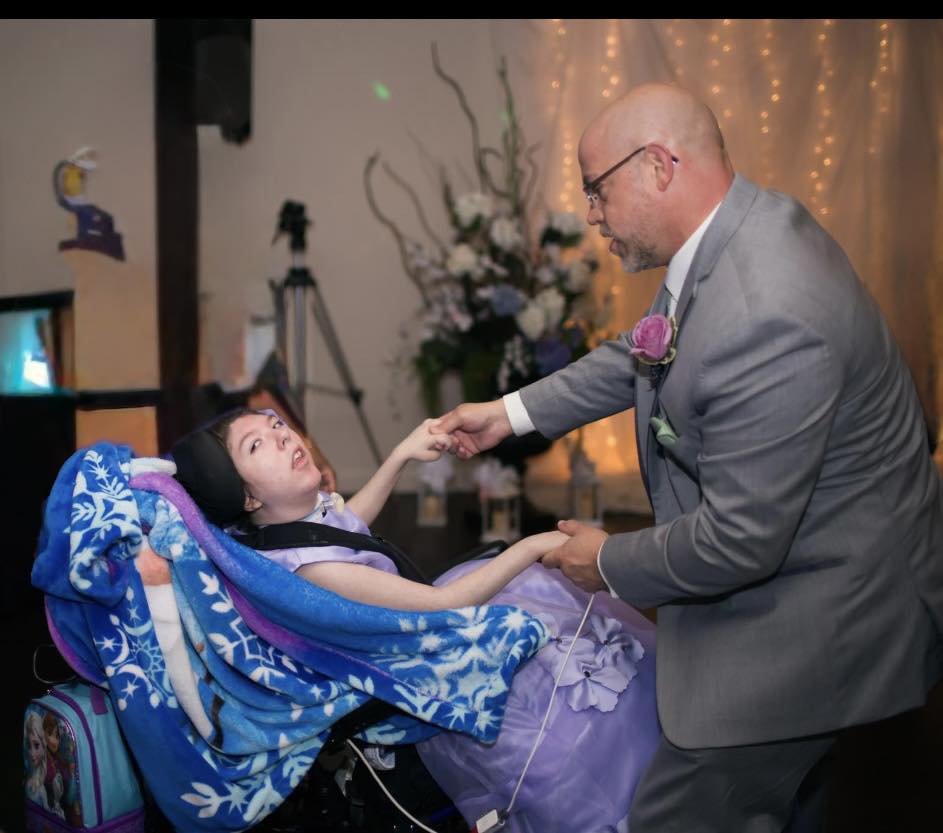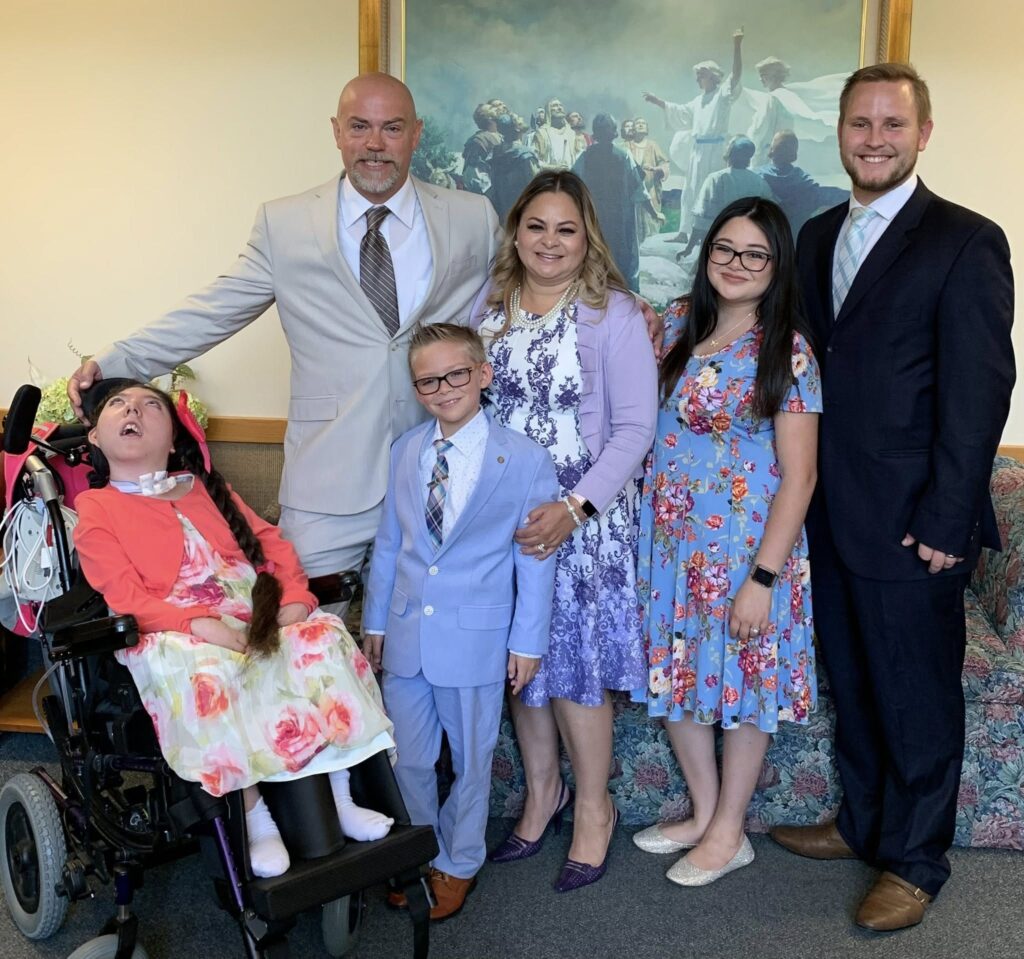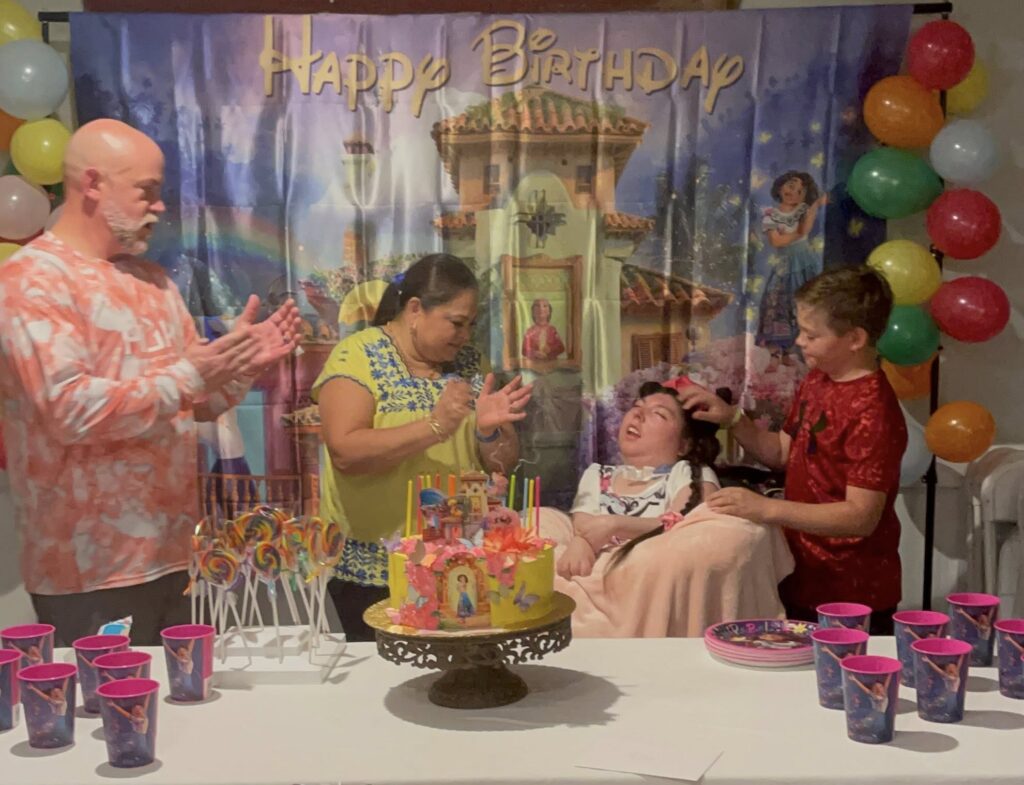Miracle child born without a brain reaches her twentieth year

From the moment Alexandra Simpson entered the world in Nebraska, doctors believed her life would be measured in hours. Her condition known as hydranencephaly meant she had been born with almost no brain tissue. Her parents were told to prepare their goodbyes before they had even held her for the first time. Yet two decades have passed since that day and Alexandra has celebrated her twentieth birthday surrounded by a community that views her as a living reminder of human resilience and hope. Her story has captured global attention through outlets like the New York Post, documenting the remarkable life of a young woman who defied every prediction.
As her family describes it, Alexandra is a miracle. The journey has not been simple. It has been filled with relentless medical challenges and years of adaptations and caregiving. Every step has required creativity patience and an unbreakable spirit on the part of both Alexandra and her loved ones. What was once considered impossible has become a testament to the power of compassion community and unwavering belief.
This article explores her extraordinary life and presents a deeper look at the science behind her condition the emotional realities her family has lived through and the profound inspiration that her journey continues to offer. This story brings together the elements that make Alexandra’s life so meaningful to so many people.

A Life That Defied Every Prediction
Alexandra’s story began with a diagnosis that typically allows little room for hope. As reported by the New York Post her parents were told that she had been born with a condition where most of the cerebral hemispheres are replaced by fluid. Many infants with this diagnosis survive only briefly after birth. Alexandra however began showing subtle signs of awareness and responsiveness that surprised her medical team.
Her parents refused to accept that their time with her would be short. They focused on nurturing every small sign of progress no matter how unexpected. According to People Alexandra responded to familiar voices in ways that doctors did not anticipate. What was believed to be impossible began to look like a new form of possibility. Her story was no longer only about medical rarity. It was about determination.
Communities in Nebraska began to share her progress and her family received messages from others who had experienced similar diagnoses. As noted, Alexandra gradually became a symbol of hope for many families facing frightening prognoses. While she required complex care her continued survival challenged long held assumptions about hydranencephaly.
Even after medical complications her parents celebrated each milestone. Alexandra grew into a young woman who expressed joy through facial reactions moments of calm and the unique forms of connection she developed with her family. Her story demonstrates that life can have purpose even in forms that do not fit conventional expectations.
The Science Behind a Remarkable Condition
Hydranencephaly is one of the rarest neurological conditions known to medicine. According to Science, children born with this condition typically have a brain stem but lack the majority of their brain tissue. The brain stem allows control of essential functions such as breathing heartbeat and sleep cycles. For Alexandra this preserved brain stem served as the foundation for her survival.
Medical reports emphasize that survival beyond infancy is extremely uncommon. Many children with hydranencephaly do not live past their first year. Alexandra reaching her twentieth birthday is considered medically extraordinary. Scientists who study the condition have expressed interest in understanding how her brain adapted over time and what factors may have contributed to her longevity.

There is ongoing research into how the human nervous system compensates for missing regions through mechanisms of neural plasticity. While scientists cannot fully explain Alexandra’s survival the possibility of previously unknown adaptive pathways is part of the active conversation. Her life prompts researchers to ask new questions about the abilities of the developing brain.
Beyond the biological explanations her story also highlights the role of dedicated caregiving. Doctors interviewed by various outlets have noted that consistent attention stable routines and emotional presence may influence health outcomes for individuals with significant neurological challenges. It is not simply about medical science. It is also about human connection.
A Family Shaped by Love Resilience and Community
Alexandra’s parents have spoken widely about the overwhelming emotions that defined the early years of her life. They faced constant hospital visits specialist consultations and uncertainties. According to report, the family remembers moments when they feared her condition would take a sudden turn. Every day felt like a gift yet every day also demanded strength.
Her parents adapted their home to accommodate her medical equipment. They learned to track subtle changes in her reactions rhythms and signs of discomfort. Their lives became a blend of caregiving advocacy and celebration. They made sure that Alexandra was included in family events birthdays and holidays. They framed her life not by limitation but by presence.

Community support also played a significant role. Some reports highlighted how neighbors friends and local organizations embraced Alexandra’s story. Fundraisers helped with medical expenses and community members visited regularly to share time with her. These connections gave her parents reassurance that they were not alone in their journey.
Over the years the family has become advocates for raising awareness about rare neurological conditions. They participate in online communities offering support to families facing similar diagnoses. For many of these families Alexandra is a symbol of courage and a reminder that predictions are not always destiny.
The Power of Small Victories in a Life Filled With Challenges
For Alexandra progress came in small meaningful moments. Her family has described these as victories that could easily be overlooked by others but carried immense importance for them. According to the New York Post she responded to familiar music especially songs that her mother sang during her early years. These reactions were signs of recognition that defied medical expectations.
Her expressions often shifted when her father entered the room suggesting comfort and connection. Her parents learned to interpret tiny facial movements as signals. These subtle forms of communication became their language with her allowing them to engage in meaningful interactions.

Many challenges remained. Alexandra required assistance for every physical need and her parents monitored her closely for potential complications. Yet even in difficult moments the family focused on gratitude. They valued the calm hours spent together the quiet mornings and the evenings when she seemed peacefully attentive to the world around her.
Supporters from around the world sent letters and messages after reading about her in Science Alert and other publications. People expressed how her story changed their perspective on compassion disability and the meaning of resilience. For her family these messages served as a reminder that Alexandra’s life reached far beyond Nebraska.
Why Her Twentieth Birthday Feels Like a Global Celebration
When Alexandra turned twenty her family marked the occasion with an intimate celebration. The milestone became widely shared after media outlets published updates about her story. Thousands of people online reacted to the news with messages of love congratulations and awe at her journey.
For her parents the birthday meant far more than a number. It symbolized two decades of defying predictions and two decades of discovering new forms of love. Every year they had hoped to celebrate one more birthday with her. Reaching this moment felt like a blessing beyond measure.

Medical professionals also expressed admiration. According to Science Alert researchers noted that her survival invites deeper inquiry into long term neurological adaptation. Her case is not simply inspirational. It is also scientifically significant offering a rare opportunity to understand how life can persist despite severe anatomical differences.
Local community members in Nebraska joined in the celebration as well. Friends neighbors and supporters who have followed her life for years saw the milestone as a triumph of collective care. The event served as a testament to the ways in which a single life can influence many others through hope and perseverance.
A Reflection on Hope Science and the Meaning of Life
Alexandra’s story inspires reflection about what it means to live a meaningful life. Many people who learn about her wonder how a person with such challenges can offer so much inspiration. Her journey demonstrates that value does not depend on ability or independence. It comes from connection love and presence.
Her life also prompts important conversations about how society views disability. Stories like hers show the importance of compassionate support accessible healthcare and advocacy for families facing rare conditions. Alexandra’s parents have often shared that she taught them patience understanding and empathy in ways they never expected.
Science continues to evolve in response to cases like hers. Researchers studying neurological development acknowledge that there is still much to learn about the human brain. Alexandra’s life offers data insights and questions that push scientific boundaries further than before.
Ultimately her story is not only about survival. It is about transformation. It is about how a family and a community embraced a life that was never expected to last and discovered profound meaning in the process.
Celebrating a Life That Redefines Possibility
Alexandra Simpson’s twentieth birthday stands as far more than a medical milestone. It represents the quiet strength of a family that refused to surrender to predictions and the extraordinary way hope can reshape even the darkest expectations. Her journey shows that resilience isn’t loud or dramatic, it grows in the everyday decisions to care, nurture, and believe when there is no roadmap to follow. Through love, consistency, and an unwavering spirit, her family has transformed what was once a story of fear into a story of possibility.
Her parents continue sharing her journey not to focus on hardship but to honor the countless moments that made their lives richer, the soft reactions, the shared routines, the subtle expressions that became a unique language of connection. Alexandra’s life has become a reminder that strength often comes from the gentlest places, and that extraordinary courage can be found in families who simply refuse to give up. Her story resonates deeply with people around the world because it challenges assumptions about ability, value, and the meaning of a full life.
As her story spreads, Alexandra continues to inspire others to look for meaning in moments that might otherwise go unnoticed. Many families facing rare medical conditions see her as a symbol of hope, proof that predicted limits are not always final. Her journey encourages people to remain open to the unexpected and to remember that possibility often lies just beyond the edge of certainty.
Featured Image Credit: Shutterstock
Loading...

